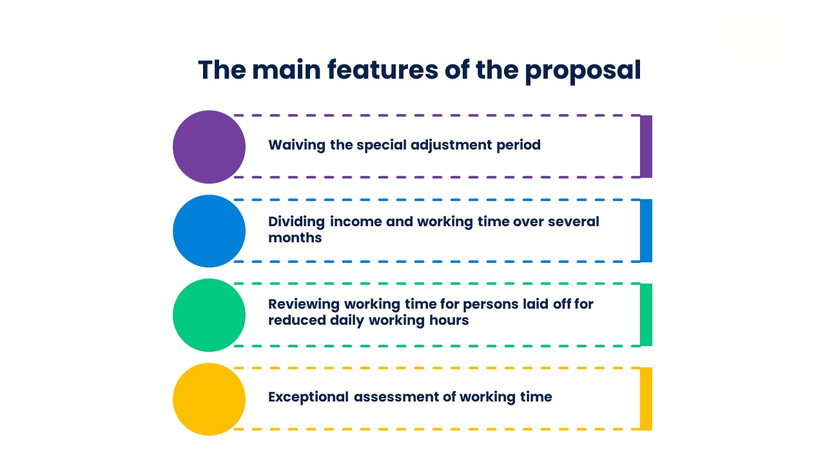On 27 September 2022, the Government introduced a
proposal to Parliament on amendments to the Act on Unemployment Security. The
amendments would apply to certain provisions on adjusted unemployment benefits.
The amendments are expected to enter into force as of 1 January 2023. Note that
the legislative amendments have not yet been approved by Parliament. We will
provide further information as the legislative amendments progress and we
receive more information about them. The main content of the proposal is outlined
below.

Waiving the
special adjustment period
The special adjustment period would no longer serve as
grounds for adjustment. The earned income paid during the adjustment period
(four weeks or one month) would be adjusted even if the income was paid during
a period for which the applicant is not entitled to an unemployment benefit.
The income paid during the adjustment period would be taken into account in the
amount of unemployment benefit as it was paid.
The special adjustment period has not been applied
since 11 May 2020 due to temporary legislative amendments caused by the
coronavirus epidemic. According to the Government proposal, the special
adjustment period would be permanently abolished.
Distribution
of earned income over several months
If the income paid during the adjustment period was
earned in an earning period longer than one month, the effect of the income is
distributed from the payment month onwards over the same number of months as
for which wages were paid at one time. The legislative amendment would specify
that the distribution of earned income would only apply to situations where the
employer has paid wages in deviation from the normal pay period. In addition, a
provision would be added according to which the working hours on which the
wages are based would also be divided equally to affect the same number of
application periods as for which the wages were earned.
Exceptional
assessment of working hours
Entitlement to adjusted earnings-based daily allowance
requires that the regular working hours under the employment contract, or the
average working time on which the monthly salary is based in periodical work,
does not exceed 80% of the maximum working hours of a full-time worker in that
sector. Currently, it is also a prerequisite that the employer monitors the
working hours. If the employer does not have the need or opportunity to monitor
the working hours, the payer of the unemployment benefit is usually unable to
establish that the conditions for the payment of the adjusted unemployment
benefit are met. In such cases, it is not possible to grant an unemployment
benefit.
According to the legislative amendment, the right to
an adjusted earnings-based daily allowance could arise even if the working
hours are not strictly monitored. This would require that the nature and
circumstances of the work are such that it can be concluded with a high degree
of certainty that the working hours do not exceed 80% of the maximum even if
the working hours are not strictly monitored. The employer and employee must
provide an account of the working hours. Such cases would be assessed
individually.
Review of
working hours for persons laid off with reduced daily working hours
Currently, the working hours of those laid off with
reduced daily working hours are examined one calendar week at a time. According to the Government proposal, the
review period for working hours would in future be the same as the adjustment
period (four weeks or one month). The change would apply to situations where
daily working hours have been reduced due to a lay-off or a reason similar to a
lay-off, or if work is prevented due to an industrial action that does not
depend on the employee’s own terms of employment or working conditions.
The full
Government proposal is available on the Parliament website (in Finnish).

